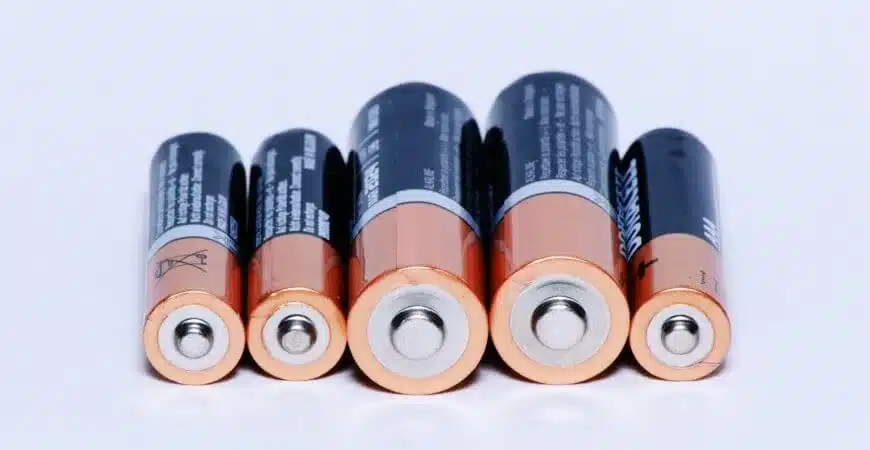Sprawdź gdzie i jak oddać zużyte baterie w UK
Utylizacja baterii to temat który wraca bardzo często. Większość osób wie, że nie wolno wrzucać ich do zwykłego kosza – i słusznie. W wielu krajach, w tym w Wielkiej Brytanii, jest to zabronione.
Dlaczego? Ponieważ baterie zawierają niebezpieczne substancje chemiczne, takie jak rtęć, kadm czy ołów. Z tego powodu wyrzucanie ich do odpadów zmieszanych, które trafiają na wysypiska, może prowadzić do poważnego skażenia gleby i wody. Co więcej, takie praktyki narażają nas wszystkich na konsekwencje środowiskowe.


Czy baterie można poddać recyklingowi?
Tak – w większości przypadków baterie można, a nawet należy, poddać recyklingowi.
Zawierają one cenne metale, które można odzyskać i wykorzystać ponownie. Na przykład – do produkcji nowych baterii lub innych komponentów elektronicznych. W rezultacie ograniczamy emisję CO₂ oraz zapotrzebowanie na wydobycie surowców.
Dlatego właśnie warto wiedzieć, gdzie oddać zużyte baterie, aby mogły trafić do legalnego punktu recyklingu.
Gdzie oddać baterie w Wielkiej Brytanii?
W UK możesz skorzystać z kilku opcji:
- lokalne centra recyklingu i ponownego użycia (tzw. Household Waste Recycling Centres),
- punkty zbiórki w sklepach – m.in. supermarkety, sklepy RTV, markety budowlane,
- wybrane punkty przyjęć odpadów komunalnych.
Co więcej, większość z nich przyjmuje zarówno baterie przenośne, jak i baterie samochodowe. Warto zajrzeć na stronę rządową: www.gov.uk/recycling-collections
Jakie baterie można oddać?
Zanim zdecydujesz, gdzie oddać baterię, sprawdź jej typ. To bardzo ważne, ponieważ różne punkty przyjmują różne rodzaje baterii.
1. Baterie przenośne
Najczęstszy typ – obejmują baterie AAA, AA, CR2032, akumulatorki do elektroniki, telewizorów, zabawek, golarek, szczoteczek elektrycznych, itp.
Zawierają m.in. lit, nikiel-kadm, cynk, mangan i inne.
Z tego względu można je bez problemu oddać w punktach zbiórki w sklepach.
2. Baterie przemysłowe
Stosowane w środowisku profesjonalnym, w maszynach, pojazdach elektrycznych, UPS-ach, agregatach prądotwórczych.
Zawierają duże ilości szkodliwych chemikaliów i wymagają specjalnej utylizacji.
Tego typu baterie należy oddać wyłącznie poprzez licencjonowane firmy odbierające odpady przemysłowe.
3. Baterie samochodowe
To duże, ołowiowo-kwasowe baterie używane do rozruchu pojazdu, świateł i zapłonu. Są one bardzo toksyczne – zawierają żrące kwasy i metale ciężkie.
Można je oddać w:
- autoryzowanych stacjach demontażu pojazdów,
- warsztatach samochodowych,
- punktach skupu złomu.
Zadbaj o środowisko – oddaj baterie tam, gdzie trzeba
Nie ryzykuj zanieczyszczenia gleby i wód. Utylizacja baterii to nie tylko obowiązek, ale i wkład w czystszą przyszłość.
Jeśli masz do oddania baterie samochodowe lub elektroniczne, skontaktuj się z nami – Metal Scrap Ltd. Oferujemy legalny odbiór odpadów, certyfikaty, a także doradztwo w zakresie bezpiecznego recyklingu.
Obserwuj nas na Facebooku i bądź na bieżąco z aktualnymi zasadami utylizacji i recyklingu w Londynie i okolicach!
FAQ – Utylizacja baterii
Czy mogę wyrzucać baterie do zwykłego kosza?
Nie. Baterie zawierają toksyczne substancje i muszą być oddane do punktu zbiórki.
Gdzie wyrzucić zużyte baterie w Londynie?
Do sklepów z elektroniką, marketów budowlanych lub do lokalnych centrów recyklingu. Możesz też skorzystać z usług firm takich jak Metal Scrap Ltd.
Czy wszystkie baterie można poddać recyklingowi?
Większość tak, w tym przenośne i samochodowe. Niektóre przemysłowe wymagają specjalnego odbioru.
Czy Metal Scrap Ltd przyjmuje baterie samochodowe?
Tak – odbieramy i recyklingujemy zużyte baterie rozruchowe zgodnie z obowiązującym prawem.